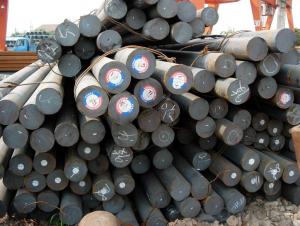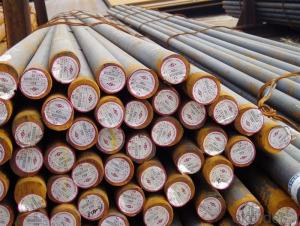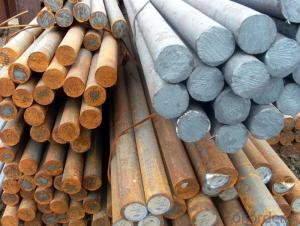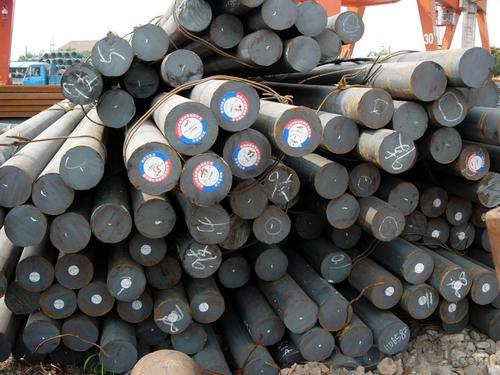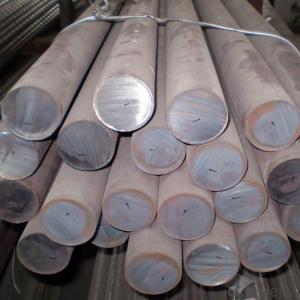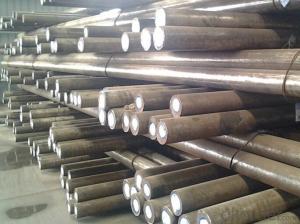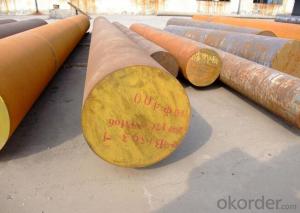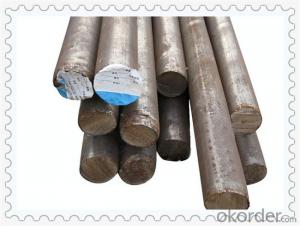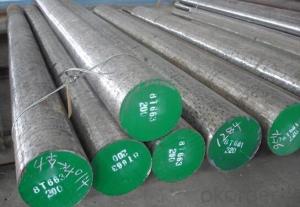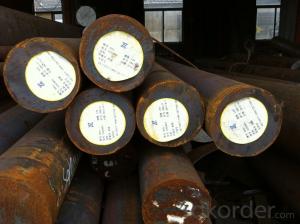42CrMo4 Alloy Steel Round Bars Hot Rolled Bars
- Loading Port:
- Tianjin
- Payment Terms:
- TT OR LC
- Min Order Qty:
- 25 m.t.
- Supply Capability:
- 50000 m.t./month
OKorder Service Pledge
OKorder Financial Service
You Might Also Like
Specification
42CrMo4 Alloy Steel Round Bars Hot Rolled Bars
Product Description:
1. Sizes: Diameter: 16mm-300mm; Length: 6m, 9m, 12m
2. Grade: 42CrMo, 4140,42CrMov4
3. Invoicing on theoretical weight or actual weight as customer’s request
4. Shape: Round bar, solid bar of steel with circular section
5. Technique: Hot rolled, forged, cold rolled
Specification:
Material | 42CrMo4 | Round bar | Dia(mm) | 16-600 |
Process | EAF + LF + VD + Forged + Heat Treatment (optional) | Length (mm) | Max 12000 | |
Heat treatment | Normalized / Annealed / Quenched / tempered | Flat bar | Thickness(mm) | 8-500 |
Delivery condition | Hot forged +Rough machined (black surface after Q/T)+ Turned (optional) | Width(mm) | 70-200 | |
Test | Ultrasonic test according to SEP 1921-84 D/d | Length (mm) | Max 12000 |
Chemical Composition:
C | Si | Mn | Cr | Ni | Cu |
0.38~0.45 | 0.17~0.37 | 0.50~0.80 | 0.9-1.2 | ≤0.030 | ≤0.030 |
Packing and Delivery:
Packing in bundle with steel strips and shipped by break bulk vessel or container (depend on target market and different ports)
Delivery Detail: Approx.45 days
Usage and Applications:
1. Steel round bar is used in a large number of architectural and engineering structures. Or it can be used in construction of plants for the production of steel house frames, high-voltage transmission towers, bridges, vehicles, boilers, containers, ships, etc.
2. And we can use this kind of product on the performance of the mechanical parts if the demand is not very high.
3. Some especial material steel round bar can be used for main shaft of steamer, hummer shank, with big section and supper force.
Product Show:
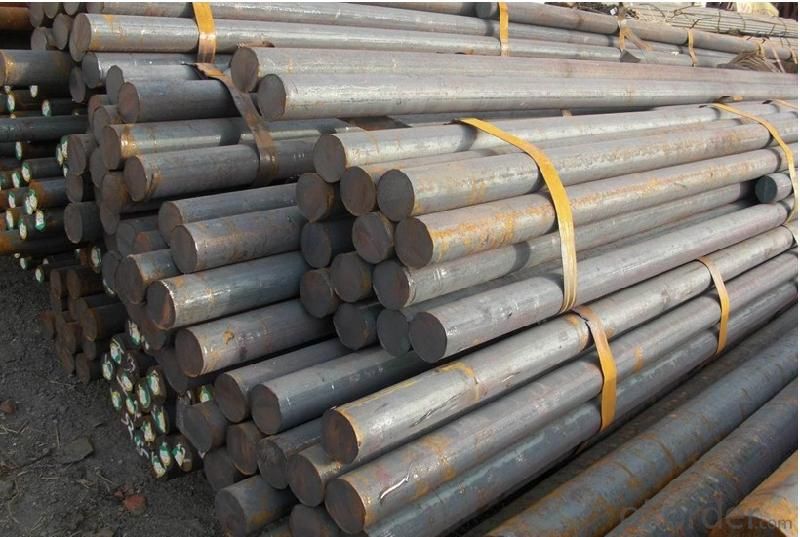
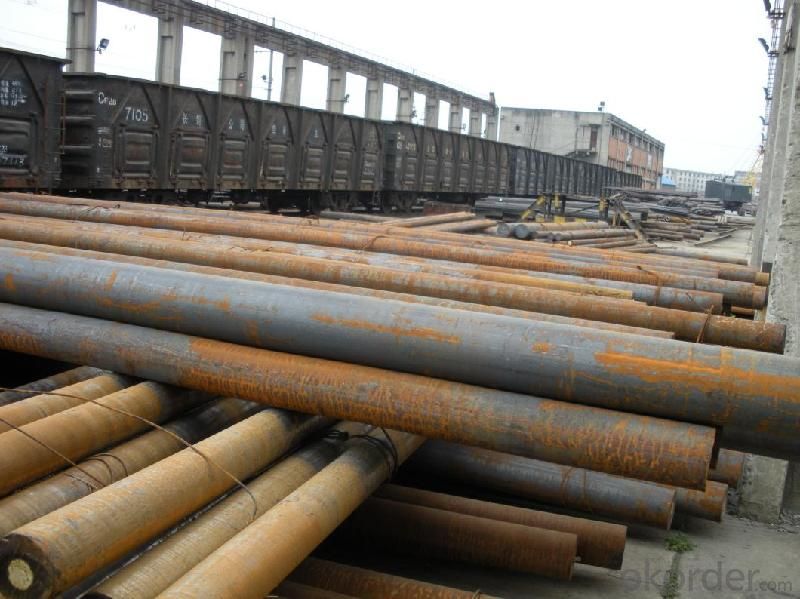
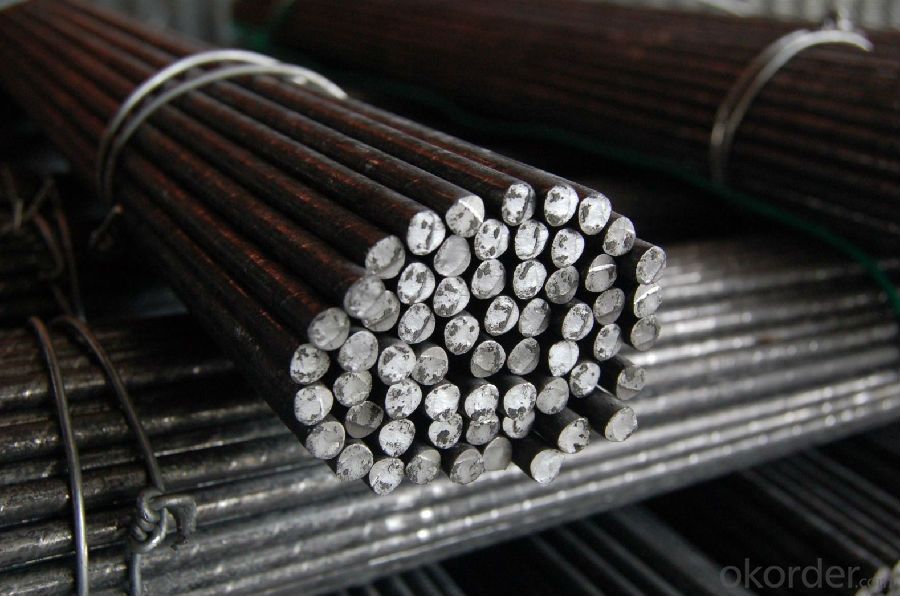
- Q: What are the different chemical resistance grades of special steel?
- The different chemical resistance grades of special steel include austenitic stainless steel, duplex stainless steel, super duplex stainless steel, and high-alloy stainless steel.
- Q: How does aluminum contribute to the properties of special steel?
- Special steel commonly incorporates aluminum as an alloying element to bolster its properties. The addition of aluminum yields multiple enhancements. Firstly, the inclusion of aluminum elevates the strength of the steel by creating a fine dispersion of aluminum nitride particles within the steel matrix. These particles act as barriers that impede dislocation movement, hindering steel deformation and amplifying its strength. Consequently, the steel becomes more resistant to mechanical stresses, thereby augmenting its load-bearing capacity. Secondly, aluminum also boosts the steel's corrosion resistance. It forms a protective oxide layer on the steel's surface, acting as a barrier against corrosive agents. This oxide layer prevents the steel from oxidizing, rusting, and deteriorating over time, thereby rendering it more durable and long-lasting in various environments. Moreover, aluminum can enhance the machinability of special steel. Its presence in the steel composition reduces the steel's tendency to work harden during machining operations. Consequently, cutting, drilling, or shaping the steel becomes easier, resulting in improved productivity and reduced tool wear. Furthermore, aluminum contributes to the heat resistance of special steel. With its high melting point and excellent thermal conductivity, aluminum aids in maintaining the steel's structural integrity at elevated temperatures. This renders aluminum-steel alloys suitable for applications demanding high-temperature resistance, such as those in the aerospace and automotive industries. In conclusion, aluminum plays a significant role in enhancing the properties of special steel. It bolsters strength, corrosion resistance, machinability, and heat resistance, making it a versatile material applicable in various fields.
- Q: What are the main alloying elements used in special steel?
- The main alloying elements used in special steel can vary depending on the specific type of special steel, but common alloying elements include chromium, nickel, molybdenum, vanadium, and tungsten. These elements are added to enhance the steel's properties such as corrosion resistance, strength, hardness, and heat resistance.
- Q: What are the main characteristics of pressure vessel steel?
- Pressure vessel steel is a specific type of steel that is designed and manufactured to withstand high-pressure environments. It possesses several distinct characteristics that make it suitable for such applications. Firstly, pressure vessel steel has excellent strength and toughness properties. It is able to withstand the internal pressure exerted on it without deforming or rupturing, ensuring the safety and integrity of the vessel. This high strength is achieved through careful alloying and heat treatment processes that enhance its mechanical properties. Secondly, pressure vessel steel exhibits good weldability. This is crucial as pressure vessels often require various components to be joined together. The ability to weld the steel without compromising its structural integrity is essential for the fabrication and maintenance of pressure vessels. Additionally, pressure vessel steel is known for its high corrosion resistance. The steel is typically alloyed with elements such as chromium, molybdenum, and nickel, which provide a protective barrier against corrosive substances and environments. This is vital in preventing the degradation of the vessel and ensuring its long-term durability. Furthermore, pressure vessel steel is characterized by its ability to withstand a wide range of temperatures. It can maintain its strength and toughness even in extreme temperature conditions, making it suitable for applications where the vessel is subjected to high or low temperatures. Lastly, pressure vessel steel is subjected to rigorous testing and quality control measures to ensure its reliability and safety. It must meet specific standards and certifications, such as those established by organizations like the American Society of Mechanical Engineers (ASME), to be deemed suitable for pressure vessel applications. Overall, the main characteristics of pressure vessel steel include high strength and toughness, good weldability, corrosion resistance, temperature resistance, and adherence to strict quality standards. These properties make it an ideal material for the construction of pressure vessels, which are used in various industries such as oil and gas, chemical processing, and power generation.
- Q: What are the different methods of measuring the hardness of special steel?
- There are several methods available for measuring the hardness of special steel. These methods can be categorized into two main categories: destructive and non-destructive testing. 1. Rockwell Hardness Test: This is a widely used destructive testing method that measures the depth of penetration of an indenter into the steel surface. The Rockwell hardness test provides a hardness value based on the resistance of the steel to indentation. It is a simple and quick method that requires minimal sample preparation. 2. Brinell Hardness Test: Another destructive testing method, the Brinell hardness test, involves applying a known load to a hardened steel ball and measuring the diameter of the indentation left on the steel surface. The hardness value is determined based on the ratio of the applied load to the surface area of the indentation. 3. Vickers Hardness Test: This is a micro-indentation test that utilizes a diamond pyramid-shaped indenter. The Vickers hardness test measures the diagonal length of the indentation left on the steel surface and calculates the hardness value based on the applied load. 4. Knoop Hardness Test: Similar to the Vickers test, the Knoop hardness test is a micro-indentation method that uses a diamond pyramid-shaped indenter. However, instead of measuring the diagonal length of the indentation, it measures the length of the long axis. This test is particularly useful for measuring the hardness of thin steel samples or steel coatings. 5. Ultrasonic Hardness Test: This non-destructive testing method measures the hardness of steel by analyzing the propagation of ultrasonic waves through the material. The hardness value is determined based on the correlation between the velocity of the waves and the hardness of the steel. 6. Magnetic Hardness Test: This non-destructive testing method utilizes magnetic properties to measure the hardness of steel. It involves applying a magnetic field to the steel and measuring the magnetic response. The hardness value is determined based on the correlation between the magnetic response and the hardness of the steel. It is important to note that each method has its advantages and limitations, and the choice of method depends on factors such as the type of steel, the required accuracy, the sample size, and the available equipment and expertise.
- Q: What are the different methods of surface electropolishing for special steel?
- There are several different methods of surface electropolishing for special steel, each with its own unique advantages and applications. 1. Immersion Electropolishing: This method involves immersing the special steel components in an electrolyte bath and passing a direct current through the solution. The current causes the surface of the steel to dissolve, resulting in a smooth and polished finish. Immersion electropolishing is commonly used for large and complex parts, as it can provide uniform surface improvement on all exposed areas. 2. Electrolytic Electropolishing: This technique involves applying a direct current directly to the surface of the special steel component using an electrode. The current causes the surface to dissolve, resulting in a smooth and reflective finish. Electrolytic electropolishing is often preferred for smaller or intricate parts, as it allows for precise control over the process and can target specific areas that require improvement. 3. Reverse Pulse Electropolishing: This method utilizes a combination of direct and reverse current pulses to achieve a superior surface finish. The reverse current pulses help to reduce the surface roughness and eliminate any embedded particles or contaminants. Reverse pulse electropolishing is particularly useful for special steel components that require enhanced corrosion resistance and improved cleanliness. 4. Magnetic Field-Assisted Electropolishing: This technique involves applying a magnetic field to the electropolishing process, which can improve the polishing rate and surface finish. The magnetic field aligns the electrical current and enhances the removal of material, resulting in a smoother and more uniform surface. Magnetic field-assisted electropolishing is often used for special steels that are difficult to polish or have complex geometries. 5. Flow-Assisted Electropolishing: This method involves using a flowing electrolyte solution to enhance the electropolishing process. The flowing solution helps to remove dissolved material from the surface and prevents the formation of gas bubbles, resulting in a smoother and more efficient polishing. Flow-assisted electropolishing is commonly used for large or flat special steel components that require a high-quality surface finish. Overall, the selection of the appropriate method of surface electropolishing for special steel depends on the specific requirements of the components, such as size, geometry, and desired surface finish. Each method offers its own benefits and considerations, and consulting with an experienced electropolishing specialist is recommended to determine the most suitable approach.
- Q: How is corrosion-resistant stainless steel used in the production of marine equipment?
- Corrosion-resistant stainless steel is extensively used in the production of marine equipment due to its ability to withstand the harsh corrosive environment of saltwater. It is used for various applications such as shipbuilding, offshore structures, and marine components like propellers, valves, and fittings. The stainless steel's resistance to corrosion helps prevent rust and degradation, ensuring the longevity and durability of marine equipment even in challenging marine conditions.
- Q: What are the properties of nitriding steel?
- Nitriding steel is a specialized process used to enhance the surface hardness and wear resistance of steel. The properties of nitriding steel include improved surface hardness, increased resistance to wear, improved fatigue strength, enhanced corrosion resistance, and reduced coefficient of friction. This process forms a hard nitride layer on the surface of the steel, making it suitable for applications in industries such as automotive, aerospace, and manufacturing, where durability and performance are crucial.
- Q: How does special steel perform in tooling applications?
- Special steel performs exceptionally well in tooling applications due to its high strength, durability, and resistance to wear and abrasion. It is specifically designed to withstand the demanding conditions of tooling environments, such as cutting, shaping, and forming various materials. The unique properties of special steel, including its excellent hardness and toughness, make it an ideal choice for producing reliable and long-lasting tools that can efficiently handle heavy workloads and maintain their performance over time.
- Q: What are the different methods of surface grinding for special steel?
- For special steel, there exist numerous techniques for surface grinding. Presented below are some of the most commonly employed methods: 1. Blanchard Grinding: To eliminate material from the steel's surface, this technique employs a grinding wheel and a rotary table. The grinding wheel, usually composed of abrasive particles bonded together in a matrix, revolves at a high speed. Blanchard grinding excels in its ability to swiftly and efficiently remove substantial amounts of material, making it ideal for roughing operations. 2. Precision Grinding: This method is frequently utilized for finishing operations that demand a high level of accuracy and surface finish. Precision grinding entails the use of a surface grinder equipped with a fine-grit grinding wheel to eliminate a small quantity of material from the steel's surface. This process is typically slower and more precise than Blanchard grinding, resulting in a smoother and more refined surface. 3. Centerless Grinding: For cylindrical steel components necessitating exceptional precision, centerless grinding is commonly employed. This technique involves feeding the steel between a grinding wheel and a regulating wheel, with the grinding wheel removing material from the surface as it rotates. The regulating wheel governs the speed and feed rate of the steel, ensuring consistent and precise grinding. 4. Creep Feed Grinding: This technique is employed for the substantial removal of stock from large steel parts. Creep feed grinding involves employing a slow feed rate and making deep cuts to eliminate material from the surface. This method is typically employed for specialized applications where traditional surface grinding methods are unsuitable due to the size or complexity of the steel part. Ultimately, the selection of a surface grinding method for special steel hinges on factors such as the desired surface finish, accuracy requirements, and the size and complexity of the steel part. Consulting with a proficient grinding professional is vital to determine the most suitable method for a specific application.
Send your message to us
42CrMo4 Alloy Steel Round Bars Hot Rolled Bars
- Loading Port:
- Tianjin
- Payment Terms:
- TT OR LC
- Min Order Qty:
- 25 m.t.
- Supply Capability:
- 50000 m.t./month
OKorder Service Pledge
OKorder Financial Service
Similar products
Hot products
Hot Searches
Related keywords
